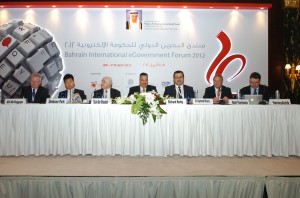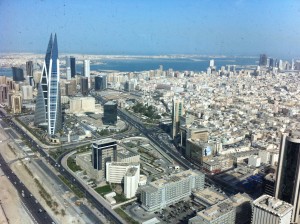 From 8 – 11 April the Bahrain International eGovernment Forum 2012 was held. On invitation by the eGovernment Authority (EGA) of Bahrain I attended the forum as a speaker. The venue was the Ritz Carlton Hotel in Manama, Bahrain’s capital. At the opening session of the forum, attended by the Prime Minster, the host country presented its new eGoverment strategy. Bahrain does comparatively well in the UN eReadiness ranking (number 36 out of 196) and is a leader in integrated online services provided through multichannels (actually number 10 of the world).
From 8 – 11 April the Bahrain International eGovernment Forum 2012 was held. On invitation by the eGovernment Authority (EGA) of Bahrain I attended the forum as a speaker. The venue was the Ritz Carlton Hotel in Manama, Bahrain’s capital. At the opening session of the forum, attended by the Prime Minster, the host country presented its new eGoverment strategy. Bahrain does comparatively well in the UN eReadiness ranking (number 36 out of 196) and is a leader in integrated online services provided through multichannels (actually number 10 of the world).
The UN eGovernment Survey 2012 apparently was used as selection criteria for the first panel session. Since the Republic of Korea is the world leader followed by the Netherlands, I was the second speaker after Deok Soo Park from Korea. In the same session Bill McCluggage of the UK and Hannes Astok of Estonia presented their countries’ strategies. In my presentation entitled “Citizen Centred eGovernment in the Netherlands” I explained our approach to citizen engagement, with the eCitizen Charter as an awareness tool. Moreover I set out why it’s time for a paradigm shift from eGoverment (technology) to Collaborative Governance (participation), which is necessary for citizen engagement to thrive and contribute to social accountablity.
During  the rest of the forum a great number of international speakers presented views and cases on eGovernment and several trends and topicslike Social Media, eParticipation, Mobility, Open Data. There was overall agreement on the need for citizen centricity and inclusion. Many speakers covered this, notably Raul Zambrano of UNDP, Julia Glidden of 21c Consultancy UK, Kei Shimada of Japan, Chris Rourke of UserVision UK, Thomasz Janovsky of UN-IIST in Macao, Stefan Gehrke of Germany. The moderators Richard Kerby and Julia Glidden led stimulating discussions. Noteworthy I found Talal Abu Ghazalah’s speech in which he made a convincing case for the eCitizen and the urgency of education reform and free online learning in the Arabic world. One of the fringe meeting was devoted to legal aspects and privacy, with contributions from Ramazan Altinok of the Turkish Prime Minster’s Office, Nibal Idlebi of UNESCWA and Wojcieh Cellary of Poznan University. One other fringe meeting about social media organised by the Social Media Club of Bahrain was successfully overcrowded.
the rest of the forum a great number of international speakers presented views and cases on eGovernment and several trends and topicslike Social Media, eParticipation, Mobility, Open Data. There was overall agreement on the need for citizen centricity and inclusion. Many speakers covered this, notably Raul Zambrano of UNDP, Julia Glidden of 21c Consultancy UK, Kei Shimada of Japan, Chris Rourke of UserVision UK, Thomasz Janovsky of UN-IIST in Macao, Stefan Gehrke of Germany. The moderators Richard Kerby and Julia Glidden led stimulating discussions. Noteworthy I found Talal Abu Ghazalah’s speech in which he made a convincing case for the eCitizen and the urgency of education reform and free online learning in the Arabic world. One of the fringe meeting was devoted to legal aspects and privacy, with contributions from Ramazan Altinok of the Turkish Prime Minster’s Office, Nibal Idlebi of UNESCWA and Wojcieh Cellary of Poznan University. One other fringe meeting about social media organised by the Social Media Club of Bahrain was successfully overcrowded.
The forum provided an excellent opportunity to share knowledge and exchange views, and the social program gave the speakers a taste of the country. Memorable was the Royal reception of the speakers by the Crown Prince as acting King. Sincere thanks for a well organised forum and friendly hospitality are due to EGA’s CEO Mohammed Ali Al-Qaed and his Forum organizer Lamya Ebrahim Hasan.
In view of the political situation in Bahrain, I was pleasantly surprised by the open program and free discussions during the conference. Bahrain is criticised for its suppression last year of a revolt which looks similar to other Arabic Spring uprisings. The country is devided into a sunnite ruling class and shiite population majority. The help of Saudi Arabia for the government and the supposed influence of Iran on the opposition complicate the conflict. The present situation seems stable, after an independent Inquiry Commission recommended reforms.
view of the political situation in Bahrain, I was pleasantly surprised by the open program and free discussions during the conference. Bahrain is criticised for its suppression last year of a revolt which looks similar to other Arabic Spring uprisings. The country is devided into a sunnite ruling class and shiite population majority. The help of Saudi Arabia for the government and the supposed influence of Iran on the opposition complicate the conflict. The present situation seems stable, after an independent Inquiry Commission recommended reforms.
Traveling to Bahrain, I reread Peter Mansfield’s “A History of the Middle East” to refresh my historical knowledge of the region where tradition and religion play another role than in the democratic and egalitarian country I live in.
On my way back I took a stopover in Dubai to see the future and visit the world’s tallest building: Burj Khalifa. That was the last missing on my track record of the top 5 buildings in the world, 4 of which I already saw as a speaker on international conferences: Twin Towers in NY, CN Tower in Toronto, Petronas Towers in Kuala Lumpur and 101 in Taipei.